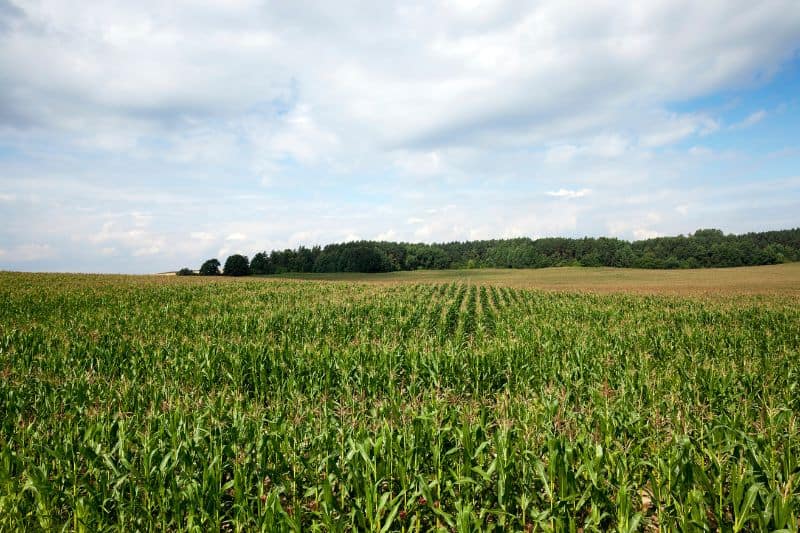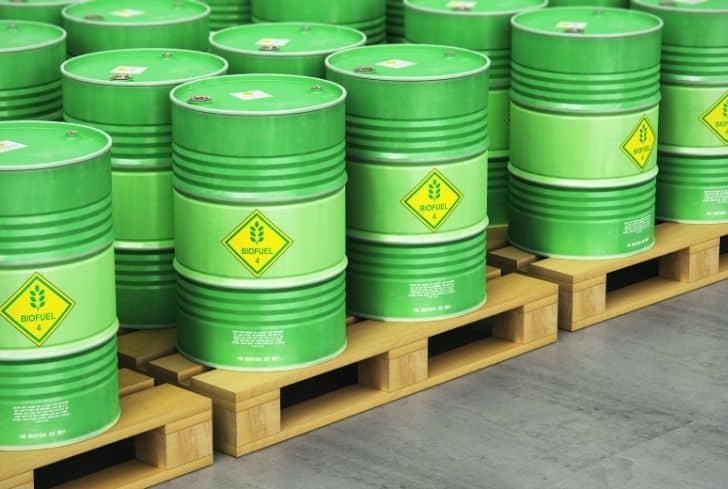Biodiesel is a renewable and clean-burning fuel made from waste vegetable oils, animal fats, or recycled restaurant grease for use in diesel vehicles. It produces less toxic pollutants and greenhouse gases than petroleum diesel.
The fuel can be used in pure form (B100) or can be blended with petro-diesel in the form of B2 (2% biodiesel, 98% petroleum diesel), B5 (5% biodiesel, 95% petroleum diesel), B20 (20% biodiesel, 80% petroleum diesel), and B100 (pure biodiesel).
Biodiesel has helped several countries reduce their dependence on foreign oil reserves as it is domestically produced and can be used in any diesel engine with little or no modification to the engine or the fuel system.
The biodiesel we use is 100 percent, it has no petroleum in it. It was already used in fryers throughout our local area. It’s already had one life and now it’s going to be used again, which is nice.
~ Daryl Hannah
Advantages of Biodiesel

Biodiesel has a plethora of benefits. Some of the common advantages of using it include:
1. Produced From Renewable Resources
Biodiesel is a renewable energy source, unlike other petroleum products that will vanish in years to come. Since it is made from animal and vegetable fat, it can be produced on demand. Plus, it causes less pollution than petroleum diesel.
2. Can be Used in Existing Diesel Engines
One of the main advantages of using biodiesel is that it can be used in existing diesel engines with little or no modifications at all and can replace fossil fuels to become the most preferred primary transport energy source.
Biodiesel can be used in 100% (B100) or blends with petroleum diesel. For instance, the B20 variant is a 20% blend of biodiesel with 80% diesel fuel. It improves engine lubrication and increases engine life since it is virtually sulfur-free.
3. Less Greenhouse Gas Emissions (e.g., B20 reduces CO2 by 15%)
Fossil fuels, when burnt, release greenhouse gases like carbon dioxide into the atmosphere. This raises the temperature and causes global warming.
To protect the environment from further heating up, many people have adopted the use of biofuels. Experts believe using biodiesel instead of petroleum diesel can reduce greenhouse gases by up to 78.45%.
4. Grown, Produced, and Distributed Locally
Fossil fuels are limited and may not be able to fulfill our demand for coal, oil, and natural gas after a certain period. As an alternative fuel, biodiesel can reduce our dependence on foreign oil suppliers as it is produced from domestic energy crops. It is produced in local refineries, reducing the need to import expensive finished products from other countries.
5. Cleaner Biofuel Refineries
When oil is extracted from underground, it has to be refined to run diesel engines. You can’t use it straight away in the crude form. Now, during the refining process, it releases many chemical compounds, including benzene and butadiene, into the environment, which are harmful to animals, plants, and human life.
In contrast, biofuel refineries primarily utilizing vegetable and animal fats in their production emit fewer toxic chemicals in the event of spills or environmental releases.
6. Biodegradable and Non-Toxic
When burnt, biofuel produces significantly less carbon output and few pollutants. Compared to petroleum diesel, biodiesel produces less soot (particulate matter), carbon monoxide, unburned hydrocarbons, and sulfur dioxide.
The flashpoint for biodiesel is higher than 150°C, whereas the same is about 52°C for petroleum diesel, which makes it less combustible. It is, therefore, safe to handle, store, and transport.
7. Better Fuel Economy
Vehicles that run on biodiesel achieve a 30% fuel economy than petroleum-based diesel engines, which means they run more miles per gallon. That means fewer trips to the filling station.
8. Positive Economic Impact
Biofuels are produced locally, which necessitates the need to employ thousands of people in the biofuel production plant. Plus, since biodiesel is produced from crops, an increase in demand for biodiesel leads to a corresponding increase in demand for suitable biofuel crops.
9. Reduced Foreign Oil Dependence
With locally produced biofuels, many countries have reduced their dependence on fossil fuels. It may not solve all problems in one blow, but a nation can save billions by reducing its usage of foreign oil.
10. More Health Benefits
Air pollution causes more deaths and diseases than any other form of pollution, causing an astounding 6.5 million deaths globally every year. Pollutants from gasoline engines, when released in the air, form smog and make thousands of people sick every year. Biodiesel, on the other hand, produces less toxic pollutants than other petroleum products.
11. Improved Air Quality
The carbon dioxide produced by the combustion of biodiesel is used up in growing the crops used to produce the biodiesel for the purpose of photosynthesis. As such, the cycle is maintained.

The probable pollutant is used up by what produces the fuel. This cycle, in turn, helps to save the earth from the jaws of global warming. All in all, air quality improves a lot by using biodiesels.
According to the National Laboratory reports carbon dioxide emissions can be reduced by a staggering 74% when we shift from petroleum to biodiesel. Even the California Air Resources Board has reported quite similar figures.
So, using biodiesel is more advantageous than you think! It’s a fuel like a fossil counterpart, but with the added advantage that it helps solve three glaring problems( pollution, squandering, and global warming) linked with fossil fuel usage.
12. Biodiesel Improves the Engine Operation of a Vehicle
We all want the engine of our vehicles to run smoothly for a long period of time. Biodiesel helps in achieving exactly that. It increases the cetane number of the fuel and the fuel lubricity — both of which help make the engine work more smoothly and effectively.
Although you must check on some automobile specifications before shifting to using biodiesel, it is completely worth everything. Nothing could possibly be better than a smoothly functioning engine.
13. Biodiesel is Undoubtedly a Safer Alternative to Fossil Fuels
When in its pure form, biodiesel is much safer than petroleum or even other fossil fuel alternatives. Any spills of pure biodiesel have much less damage potential than when a similar accident spills petroleum.
It can be seen more clearly if the flashpoints of the two fuels are compared. For biodiesel, the flashpoint is approximately 130oC, whereas, for diesel, it is only about 52oC, which is really very low. Thus, this makes petroleum way more dangerous and inflammable than biodiesel. It will, therefore, always remain a safer alternative than petroleum.
14. Biodiesel Could Possibly End Energy Crisis and Energy Politics
Energy crisis and energy politics have constantly threatened world peace. Although sometimes it is not taken as seriously as it should be, energy production and usage could become one of the major causes leading to yet another world war. Biodiesel could possibly put an end to all these tensions.
If countries could start producing biodiesel indigenously, it would reduce the amount of oil imported to or exported from a country. This, in turn, could balance the country’s economy and reduce geopolitical tensions.
Disadvantages of Biodiesel
Despite the numerous advantages, biodiesel, like any other fuel type, has a few drawbacks.
Here are some of the disadvantages:
1. Variation in the Quality of Biodiesel
Biodiesel is made from a variety of biofuel crops. When the oil is extracted and converted to fuel using the chemical process, the result can vary in the ability to produce power. In short, not all biofuel crops are the same, as the amount of vegetable oil may vary.
2. Not Suitable for Use in Low Temperatures
Biodiesel gels in cold weather, but the temperature it will gel depends on the oil or fat used to make it. The best way to use biodiesel during the colder months is to blend it with winterized diesel fuel.
3. Biodiesel Could Harm the Rubber Houses of Some Engines
While using biodiesel increases an engine’s efficiency, it can also considerably damage the rubber houses of some engines. So, before shifting to biodiesel, all these points must be considered.
4. Biodiesel is Way More Expensive than Petroleum
In recent years, the fact is that biodiesel is way more expensive than other conventional fuels. Currently, it is almost 1.5 times more expensive than petroleum. Using it could thus turn into a really expensive affair for many.
5. Food Shortage
Since biofuels are made from animal and vegetable fat, more demand for these products may raise prices for these products and create a food crisis in some countries.
For instance, the production of biodiesel from corn may raise its demand, pushing the prices for the commodity up, and that could deprive poor people of having it.
6. Increased use of Fertilizers
As more crops are grown to produce biofuels, more fertilizer is used, which can have a devastating effect on the environment. The excess use of fertilizers can also result in soil erosion and lead to land pollution.
7. Clogging in Engine
Biodiesel cleans dirt from the engine. This proves to be an advantage of biofuels, but the problem is that this dirt gets collected in the fuel filter and clogs it.
8. Regional Suitability
Some regions are not suitable for oil-producing crops. The most productive crops can’t be produced anywhere, and they need to be transported to the plants, which increases the cost and amount of emission associated with production and transportation.
9. Water Shortage
The use of water to produce more crops can put pressure on local water resources. In areas facing water scarcity, the production of crops to be used for biofuels is not a wise idea.
10. Monoculture
Monoculture refers to producing the same crop repeatedly rather than producing different crops. While this results in fetching the best price for the farmer, it has some serious environmental drawbacks.

When the same crop is grown over large acres of land, the pest population attracted by that specific crop may grow and go beyond control. Plus, soil nutrients are not returned without crop rotation, which may result in soil erosion.
11. Fuel Distribution
Biodiesel is not distributed as widely as petroleum diesel. The infrastructure still requires more boost to adopt it as the most preferred way to run engines.
12. Use of Petroleum Diesel to Produce Biodiesel
It requires a lot of energy to produce biodiesel fuel from soy crops as energy is needed for sowing, fertilizing, and harvesting crops.
Also, raw materials must be transported by trucks, which consume some additional fuel. Some scientists believe that producing one gallon of biofuel needs energy equivalent to several gallons of petroleum fuel.
13. Slight Increase in Nitrogen Oxide Emissions
Biodiesel has about 10% higher Nitrogen Oxide (NOx) than other petroleum products. Nitrogen Oxide is one of the gases that is used in the formation of smog and Ozone. Once it gets dissolved in atmospheric moisture, it can cause acid rain.







